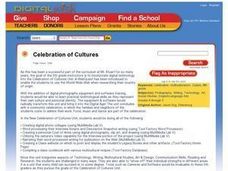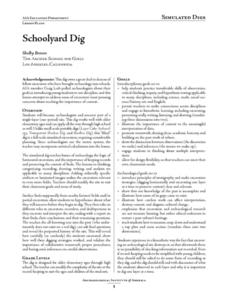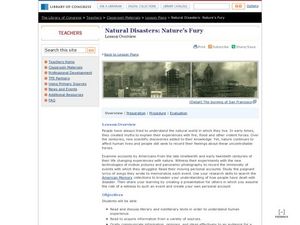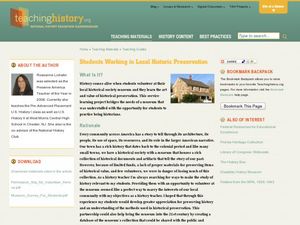Curated OER
The Inventions and Effects of the Industrial Revolution
Students understand that the Industrial Revolution began in England, spreading to the rest of Western Europe and the United States and with it came an increased demand for raw materials from the Americans, Asia, and Africa.
Curated OER
What Fostered the Axis?
Ninth graders present the major cultural, economic and political forces in Germany, Italy & Japan that allowed for the rise and dominance of totalitarian regimes in that country. They discuss how the above listed forces brought the...
Curated OER
Charge and Defeat
Pupils discuss traditional tools used by historians and archaeologists. They conduct a debate on the advantages and disadvantages of rewriting the past and discuss which side of the debate has the strongest case.
Curated OER
Celebration of Cultures
Students create a multimedia project to represent their own culture and personal identity. They design a personal Coat of Arms using a computer graphics program and digital camera, write a script and film an interview, and contribute a...
Curated OER
Schoolyard Dig
Learners begin the lesson plan by being introduced to the new vocabulary associated with archaeology. In groups, they use the school grounds to simulate their dig site. They record all the objects they discover and what can be gathered...
Curated OER
Cargoes from Three Continents Ancient Mediterranean Trade
Sixth graders begin the lesson plan by researching the different types of ships and shipbuilding techniques used to help trade in the Mediterranean Sea. Using different objects, they determine what one can tell about a society and...
Curated OER
Why Not Come to North Amercia?
Students examine the motives for French expansion into the New World, they evaluate primary source documents to determine who, what, when, where and why.
Curated OER
VA Statute for Religious Freedom, III
Students analyze the Virginia Statute for Religious Freedoms and consider its implications. In this governing principles lesson, students explore primary and secondary sources regarding the document penned by Thomas Jefferson.
Curated OER
Geographic Context for War
Students explore the geography of Korea. In this Korean War lesson, students examine maps of the country and label landforms, bodies of water, climate, population centers, and neighboring countries to determine the significance of...
Curated OER
Religious Tolerance in Pennsylvania
Students analyze Quakers including their beliefs. For this religious tolerance lesson students predict the future effects of the colonies.
Curated OER
The Decisive Victory: Philadelphia and the Winning of the War for American Independence
High schoolers examine primary documents and apply their knowledge to describe them. For this primary document analysis lesson plan students interpret sources and evaluate roles of foreign allies.
Curated OER
The 1860 Election in Pennsylvania
Young scholars examine the political parties of the 1860 election and compare their platforms. In this election lesson young scholars determine the meaning of a political cartoon and predict the outcome of the 1860 election.
Curated OER
The Huexotzinco Codex
Students examine primary sources and perform historical analysis. In this Huexotzinco Codex instructional activity, students investigate the codex as they make inferences and draw conclusions
Curated OER
Out of the Mud
Eleventh graders explore the impact the automobile had on Iowans and their ways of life. In this technology lesson plan, 11th graders research how Iowans promoted "Good roads" and the reasons for paving roads.
Curated OER
Natural Disasters: Nature's Fury
Students explore the human experience. In this business ethics lesson plan, students analyze primary sources to develop an understanding of the American natural disasters of the 19th and 20th centuries and the implications they presented.
Curated OER
Child Labor in America
Students interpret historical evidence presented in primary and secondary sources. In this child labor lesson, students examine the issue of child labor and determine how citizen action prompted...
Curated OER
Students Working in Local Historic Preservation
Students develop an appreciation of history as they volunteer their time in historical museums. In this historical perspectives lesson plan, students work with valuable local documents as they aid the staff of selected local historical...
Curated OER
Lewis & Clark: A Scientific Journey
Students act as archaeologists. In this Lewis and Clark expedition lesson, students develop a list of questions that archaeologists might use to find the physical remains of the expedition and then use print and Internet sources to...
Curated OER
Kwanzaa: An African-American Heritage Celebration
Students explain some of the symbols of Kwanzaa. They demonstrate their understanding of Kwanzaa by making a book about what they have learned.
Curated OER
Rock Speaks
Students create primitive forms and caricatures to represent meaningful figures and/or events in their own lives, present their own works to the class, and attempt to interpret the relevant meaning from other students' work.
Curated OER
Ancient Civilizations: Mesopotamia
Learners read about the ancient civilization of Mesopotamia. They investigate the art, culture, and history, and read an overview about the gods and goddesses.
Curated OER
Sunken Slave Ship
Students imagine they are archaeologists who are looking for treasure under the sand or sea. They work in teams to create the story and site of a shipwreck in a tub or aquarium filled with sand and water.
Curated OER
Finding Their New World
First graders place stickers on maps indicating their understanding of the cardinal directions. They locate Jamestown, England, the Atlantic, and Virginia.
Curated OER
Days of '49: "I've Been Toiling Hard for the Last Two And a Half Years"
Students trace the stages of gold mining in California. They discuss the life of a gold miner and how the discovery of gold influenced towns and cities in California during the 1949 Gold Rush.

























